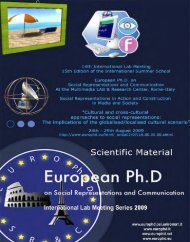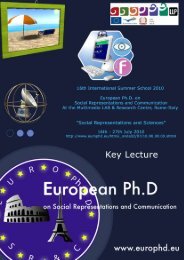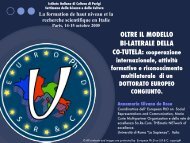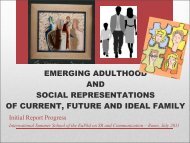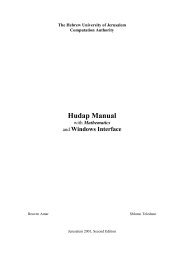The "boomerang" effect of the radicalism in discourse analysis
The "boomerang" effect of the radicalism in discourse analysis
The "boomerang" effect of the radicalism in discourse analysis
Create successful ePaper yourself
Turn your PDF publications into a flip-book with our unique Google optimized e-Paper software.
epresentations") which for a longer time had been proposed as an alternative to <strong>the</strong><br />
<strong>in</strong>dividualism specific to <strong>the</strong> cognitivism <strong>of</strong> North American mould.<br />
Both Social Cognition and Social Representation <strong>the</strong>ories have been challenged by<br />
rhetorical and discoursive psychology by us<strong>in</strong>g arguments which do not leave space for<br />
any compatibility (Litton & Potter, 1985; Parker, 1991; Edwards, 1991; Potter, 1992;<br />
Potter and We<strong>the</strong>rell, 1998; Potter & Edwards, 1999 <strong>in</strong>ter-alia). <strong>The</strong>se autors reject <strong>the</strong><br />
ontology <strong>of</strong> cognitivism and any form <strong>of</strong> its reified categories (scripts, schema, prototypes,<br />
representations etc.) <strong>in</strong> favour <strong>of</strong> language and its social construction as be<strong>in</strong>g central to an<br />
understand<strong>in</strong>g <strong>of</strong> everyday talk (<strong>discourse</strong>) produced by people and <strong>the</strong> media.<br />
If a multi-prospective look is adopted to <strong>the</strong> evolution <strong>of</strong> <strong>the</strong> debate, it is <strong>in</strong>terest<strong>in</strong>g<br />
not only to stop at enumeration <strong>of</strong> <strong>the</strong> criticisms (for this purpose see de Rosa, 1994), but<br />
to ga<strong>the</strong>r <strong>the</strong> dynamism <strong>of</strong> <strong>the</strong> confrontation activated <strong>in</strong> <strong>the</strong> wider scenario <strong>of</strong> <strong>the</strong><br />
discipl<strong>in</strong>e between proposed or re-read paradigms as mutually exclud<strong>in</strong>g each o<strong>the</strong>r or as<br />
compatible.<br />
<strong>The</strong> reaction to <strong>the</strong> ever more consistent criticisms com<strong>in</strong>g from <strong>the</strong> socioconstructionism<br />
side may be classified <strong>in</strong>to strongly "antagonist" (total refusal) positions,<br />
strongly "associative" (unconditional adhesion) or ra<strong>the</strong>r aim<strong>in</strong>g towards "mediation"<br />
(<strong>in</strong>tegration and search for compatibility).<br />
Faced with <strong>the</strong> emergence <strong>of</strong> <strong>the</strong> socio-constructionism criticism - generally ascribed<br />
to Gergen's article-manifesto Social Psychology as History (1973) - and faced with <strong>the</strong><br />
subsequent radicalisation <strong>of</strong> <strong>the</strong> criticism by <strong>discourse</strong> <strong>analysis</strong> to <strong>the</strong> cognitivistic<br />
ma<strong>in</strong>stream <strong>of</strong> experimental social psychology, various positions have arisen referable to<br />
<strong>the</strong> follow<strong>in</strong>g:<br />
- now to a total refusal <strong>of</strong> <strong>the</strong> criticism expressed with regard to <strong>the</strong> experimentalists<br />
(Greenwald, 1976; Jones, 1985; Schlenker, 1974; Zajonc, 1989);<br />
- now tend<strong>in</strong>g towards recognis<strong>in</strong>g its <strong>in</strong>terest for <strong>the</strong> restitution <strong>of</strong> social psychology<br />
to history and to <strong>the</strong> social dimension (McGuire, 1976; Moscovici, 1988; Triandis, 1989;<br />
Markus & Kitayama, 1991);<br />
- now, f<strong>in</strong>ally -as <strong>in</strong> <strong>the</strong> recent review <strong>of</strong> Arie Kruglanski and John Jost (2000) -<br />
aim<strong>in</strong>g to identify <strong>the</strong> factors <strong>of</strong> cont<strong>in</strong>uity, compatibility and <strong>in</strong>tegration among those<br />
which <strong>the</strong> two well-known social psychologists def<strong>in</strong>e as two "subcultures" <strong>of</strong> social<br />
psychology, identify<strong>in</strong>g <strong>the</strong> not necessarily <strong>in</strong>compatible differences, at method level<br />
(experimental versus qualitative), and focus<strong>in</strong>g now on <strong>the</strong> "contents" <strong>of</strong> social knowledge<br />
(socio-constructionism) and now on <strong>the</strong> "processes" that determ<strong>in</strong>e it (experimental<br />
psychology).<br />
“... social constructionism more is less <strong>of</strong> a rebellion aga<strong>in</strong>st experimental social psychology than it is an<br />
<strong>in</strong>spired expression <strong>of</strong> <strong>the</strong> field’s major lessons. <strong>The</strong> primary difference between <strong>the</strong> two perspectives is that<br />
experimental social psychologists reta<strong>in</strong> objectivist methods to study subjectivity, whereas social<br />
constructionanists use evidence concern<strong>in</strong>g <strong>the</strong> fallibility <strong>of</strong> human perceptions to reject <strong>the</strong> very methods <strong>of</strong><br />
<strong>the</strong> science itself. (...) ”<br />
“We argue that even though <strong>the</strong> differences between <strong>the</strong>se “two subcultures” <strong>of</strong> social psychology may<br />
appear to be <strong>in</strong>commensurabile, upon closed <strong>in</strong>spection, <strong>the</strong>re seems to be a variation <strong>in</strong> emphasisis ra<strong>the</strong>r<br />
than a disagreement about fundamental pr<strong>in</strong>ciples <strong>of</strong> human behaviour. We argue that <strong>the</strong> two approaches are<br />
compatibile at <strong>the</strong> level <strong>of</strong> both <strong>the</strong> substance and <strong>the</strong> strategy <strong>of</strong> research, and we underscore <strong>the</strong>ir jo<strong>in</strong>t<br />
4




